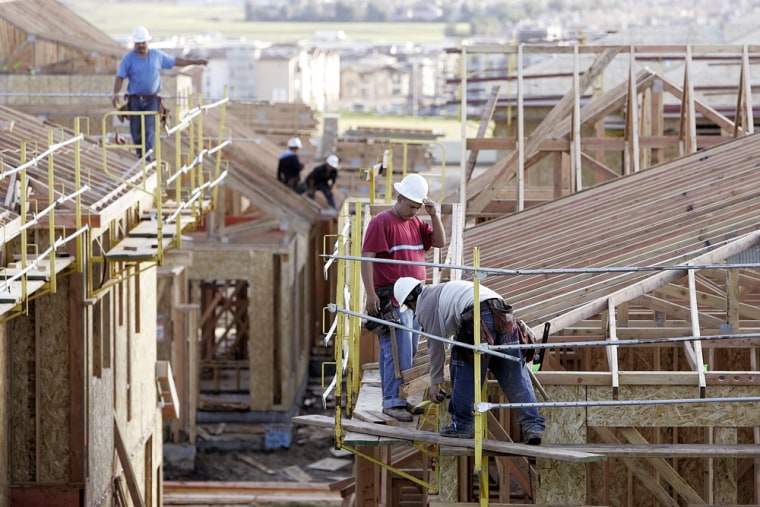New-home construction surged in January to the strongest pace in more than three decades, but analysts said the burst of activity stemmed from unusually warm winter weather and did not change forecasts for a slowdown this year.
Housing starts rose 14.5 percent last month when compared to December, pushing construction to a seasonally adjusted annual rate of 2.276 million units, the fastest rate since March 1973, the Commerce Department said Thursday.
But industry analysts pointed out that January is typically one of the slowest times of year to start construction on new homes and apartment buildings, so the surge is based on a relatively small change in activity.
Specifically builders started work on 151,000 housing units, compared with 143,000 in January 2005, when the weather was more seasonally cold and wet in much of the country.
"The warmest winter weather on record is what is driving a lot of this," said David Seiders, chief economist for the National Association of Home Builders. "I think that is the key factor behind this very strong surge in housing market activity, and as we move forward I think we're going to see these numbers come back down a lot."
Seiders, who called the January result "rather outlandish," said the surge in activity did not change his prediction that housing starts and sales would decline in 2006 after years of record-setting gains that have sent prices soaring in many parts of the country.
Jim Glassman, senior U.S. economist at J.P. Morgan, agreed that the housing starts were mainly a symptom of the unusually warm weather.
"Housing is very weather-sensitive," he said. "If you have no snow on the ground, and the builder is able to get the hole dug, it allows him to avoid bottlenecks in the spring."
Housing starts rose 37 percent in the Northeast, compared with year-earlier levels, and 14 percent in the Midwest. Starts rose 6 percent in the South, which is by far the biggest region for new-home building, and activity fell in the West compared with a year ago.
Permits, considered a good indication of future activity, rose as well in January, climbing 6.8 percent from the December level to an annual rate of 2.217 million units. Applications for building permits had been down 4.1 percent in December.
There have been clear signs that housing activity is slowing as prices soar beyond the reach of many families and mortgage rates rise.
Forecasters believe that sales of both new and existing homes will decline slightly this year and prices, which have been surging, will rise but at a slower pace than the double-digit gains seen in much of the country in recent years.
The National Association of Realtors reported Thursday that the slowing in sales that started at the end of 2005 has yet to dampen price gains.
The Realtors found that 72 metropolitan areas around the country reported double-digit gains in median home prices for existing homes sold in the last three months of 2005, compared to the same period in 2004. That was a record level for areas reporting double-digit price increases, besting the old mark of 69. The biggest gain came in the metropolitan area that includes Phoenix, Ariz., where home prices shot up by 48.9 percent.
Some economists have expressed concerns that once home sales start to slide, the big price gains could turn into sharp declines in prices in some areas, bursting the speculative bubble in much the same way that the stock market bubble burst in early 2000, triggering shockwaves that helped to push the country into a recession.
However, new Federal Reserve Chairman Ben Bernanke, testifying to Congress on Wednesday, said he did not expect such a severe impact from the housing slowdown.
“A leveling out or a modest softening of housing activity seems more likely than a sharp contraction,” he told members of the House Financial Services Committee.
